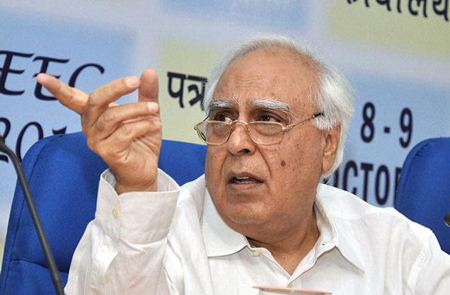
New Delhi, Jan 12: Union minister Kapil Sibal on Friday warned against foreigners who come to India to do business. His remark comes at a time when the UPA-2 government at the Centre is trying to attract foreign direct investment ( FDI) to boost the economy.
Pointing to history, communication and IT minister Sibal said, "People from foreign countries have come to India for business and then became rulers of the country. Today, they are again coming to do business here and divide us. We must be careful of them."
Sibal was speaking at a programme where President Pranab Mukherjee released a commemorative postage stamp on Shaikhul Hind Maulana Mahmood Hasan's Silk Letter Movement.
Before the president arrived, Sibal spoke about the contribution of the Silk Letter Movement to India's freedom struggle and its syncretic culture.
Mukherjee said the movement reflects the "multi-cultural and multi-faceted dimension of the freedom struggle" and needs to be acknowledged and appreciated.
Jamiat Ulama-i-Hind leader Maulana Mahmood Madani, also the chairman of Shaikhul Hind Educational Charitable Trust, urged Sibal to include the Silk Letter Movement in history text books so that the younger generation learn about an important facet of India's freedom movement.
Speaking about the role of Obaidullah Sindhi and Maulana Mahmood Hasan, leaders of the movement, Mukherjee said, "This movement was a plan to mobilise the support of the governments of Afghanistan and Turkey in organising a revolt within India to overthrow the British rule."
The stories of struggle need to be told and re-told to a young generation born in a free India and enjoying the fruits of liberty, he said.





Comments
Add new comment